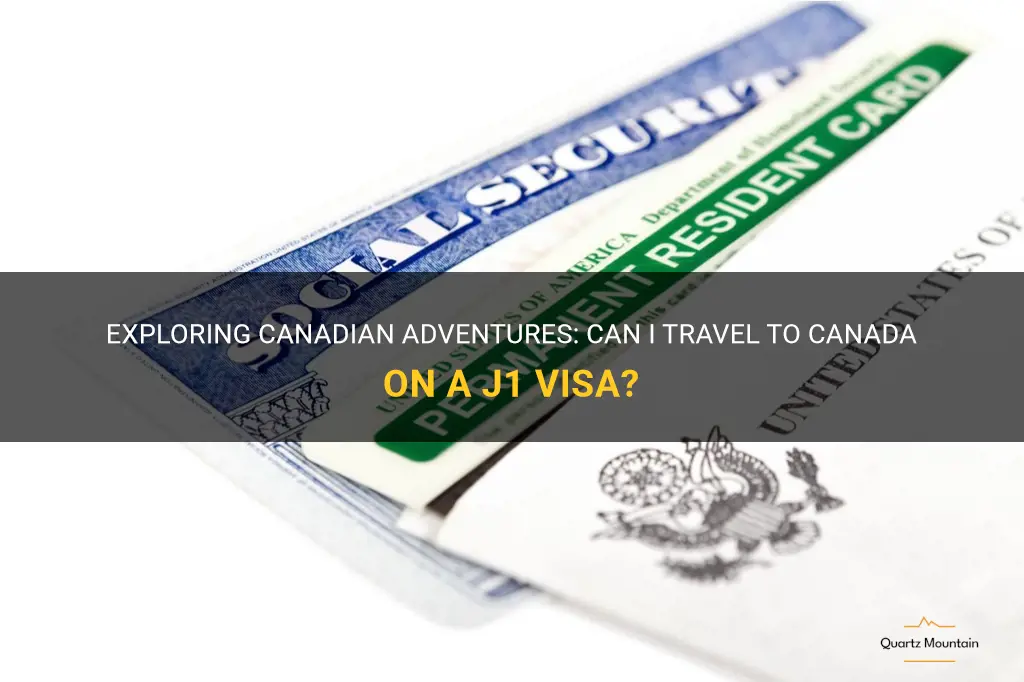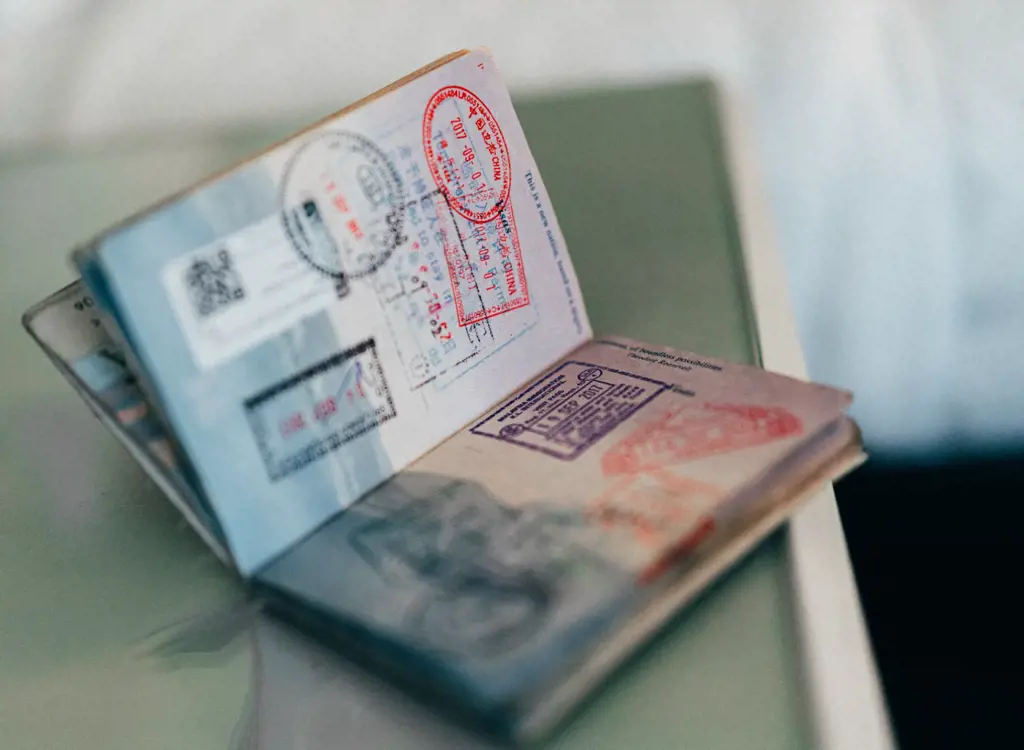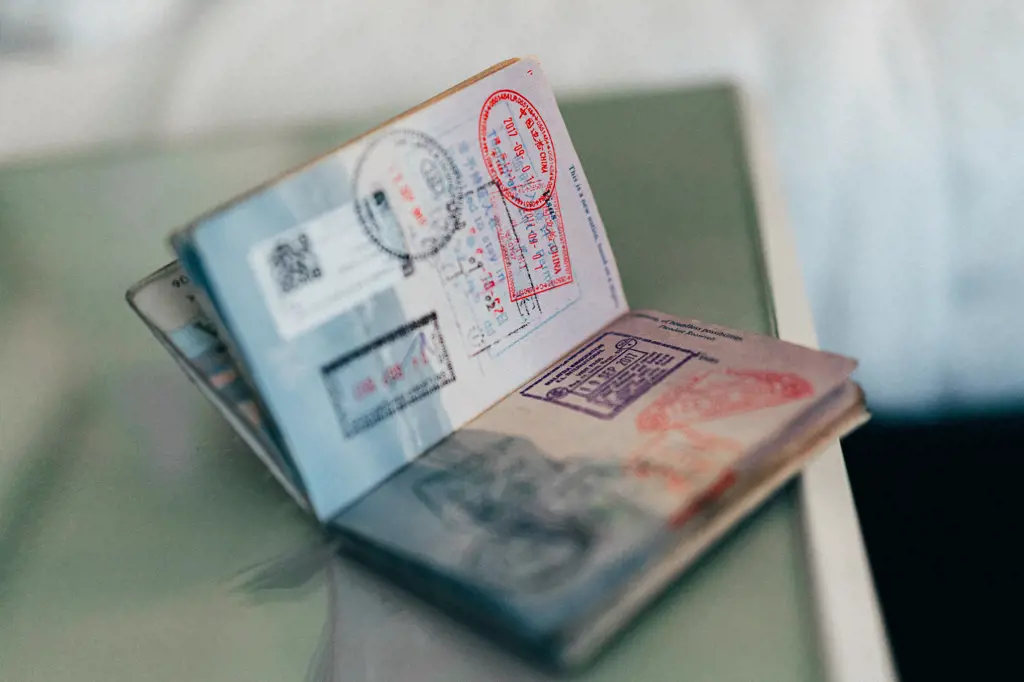
Canada is a land of natural beauty, diverse landscapes, and thrilling outdoor adventures. From the breathtaking Rocky Mountains to the rugged coastlines of Newfoundland, there is no shortage of exciting experiences to be had in this vast country. For those considering a journey to Canada on a J1 Visa, the possibilities for exploration are endless. Whether it's hiking through the pristine wilderness, exploring vibrant cityscapes, or immersing yourself in Canadian culture, this article will delve into the requirements and opportunities for J1 Visa holders looking to embark on a Canadian adventure. So grab your passport and get ready to discover this incredible country on your J1 Visa!
What You'll Learn
- What is a J1 visa and how does it pertain to travel to Canada?
- Are there specific requirements or restrictions for traveling to Canada on a J1 visa?
- Do I need to apply for a separate visa to enter Canada on a J1 visa?
- Are there any additional documents or paperwork needed to enter Canada on a J1 visa?
- What are the limitations or conditions for traveling to Canada on a J1 visa?

What is a J1 visa and how does it pertain to travel to Canada?

A J-1 visa is a non-immigrant visa issued by the United States to individuals who are participating in designated exchange visitor programs. It allows foreign nationals to travel to the United States for educational and cultural exchange purposes. The J-1 visa program is overseen by the U.S. Department of State and aims to promote mutual understanding between the United States and other countries.
To obtain a J-1 visa, individuals must be sponsored by an approved program sponsor. These sponsors can be educational and cultural institutions, as well as government agencies and private sector organizations. The sponsor must provide the necessary documentation and support for the visa application, including issuing a form DS-2019, also known as the Certificate of Eligibility for Exchange Visitor Status.
The J-1 visa is commonly used for a variety of exchange programs, including work and travel, internship, research, and au pair programs. Each program has its own specific requirements and participants must meet the eligibility criteria set by the program sponsor. For example, the work and travel program allows university students to work and travel in the United States during their summer vacation, providing them with an opportunity to experience American culture and improve their English language skills.
In addition to the work and travel program, the J-1 visa also encompasses the internship program, which allows students and recent graduates to gain practical experience in their field of study. This program is especially popular among international students who wish to gain valuable experience in the United States before returning to their home country to pursue their careers. The research program is another option for individuals pursuing academic or scientific research, allowing them to collaborate with U.S. institutions and further their research interests.
Once the J-1 visa is granted, participants are subject to the rules and regulations of the program they are enrolled in. They must maintain their status by adhering to the program requirements, including maintaining a valid U.S. address, pursuing the program activities as agreed upon, and reporting any changes or incidents to their program sponsor. Failure to comply with these requirements can result in termination of the J-1 visa status and possible deportation. It is important for participants to fully understand and follow the program rules to ensure a successful and enjoyable exchange experience.
While the J-1 visa is primarily associated with travel to the United States, it can also pertain to travel to Canada under certain circumstances. For example, if an individual is participating in a program that includes a component in Canada, they may be able to travel to Canada as part of their J-1 visa. However, this requires prior authorization from both the U.S. program sponsor and the Canadian immigration authorities.
In conclusion, the J-1 visa is a valuable opportunity for individuals to travel to the United States for educational and cultural exchange purposes. It is important to carefully research and choose a program that aligns with your interests and goals. Additionally, if you are considering travel to Canada as part of your J-1 visa program, make sure to communicate and coordinate with both your program sponsor and the Canadian immigration authorities to obtain the necessary permissions and ensure a smooth travel experience.
Is it Possible to Travel Two Weeks Before My Visa Expiration Date?
You may want to see also

Are there specific requirements or restrictions for traveling to Canada on a J1 visa?

If you are planning to travel to Canada on a J1 visa, it is important to be aware of the specific requirements and restrictions that apply to this type of visa.
Eligibility Criteria:
To be eligible for a J1 visa to Canada, you must meet certain criteria. These criteria may vary depending on the specific program or exchange visitor category you are applying for. Generally, you will need to:
- Have a valid passport that remains valid for the duration of your stay in Canada.
- Be sponsored by a designated program sponsor, such as a government agency, educational institution, or international organization.
- Demonstrate sufficient funds to support yourself during your stay in Canada.
- Have health insurance coverage that meets the requirements set by the Canadian government.
- Meet any additional requirements specific to your program or category.
Program Restrictions:
Different J1 visa categories have specific restrictions that you must adhere to during your stay in Canada. Some common restrictions include:
- Time limitations: The duration of your J1 visa may be limited to a specific period, depending on your program category. You must leave Canada before your visa expires, unless you apply for an extension.
- Work restrictions: While some J1 visa holders may be eligible to work in Canada, others may not. Check the specific regulations of your program category to understand the limitations on employment.
- Internship/trainee requirements: If your J1 visa is for an internship or training program, you will need to abide by the specific terms and conditions of your program. This may include completing a certain number of hours of training or adhering to a specific curriculum.
Travel Documentation:
In addition to your J1 visa, you will need to carry certain travel documents to enter Canada. These documents may include:
- Valid passport: Ensure that your passport is valid for at least the duration of your stay in Canada.
- J1 visa: Have a copy of your J1 visa and any associated documentation, such as your DS-2019 form.
- Letter of invitation: Depending on your program, you may be required to carry a letter of invitation from your program sponsor in Canada.
- Other supporting documents: It is always a good idea to carry any additional documents that may support your purpose of travel, such as proof of accommodation, return tickets, and financial records.
COVID-19 Restrictions:
Due to the ongoing COVID-19 pandemic, there may be additional restrictions and requirements for travelers entering Canada on a J1 visa. These restrictions may include mandatory quarantine periods, COVID-19 testing, and proof of vaccination. It is important to stay updated on the latest travel advisories and requirements issued by the Canadian government.
In conclusion, if you are planning to travel to Canada on a J1 visa, make sure to carefully review the specific requirements and restrictions that apply to your program category. Ensuring that you meet all the necessary criteria and have the required documentation will help facilitate a smooth entry into Canada. Additionally, stay informed about any COVID-19 related restrictions and requirements that may be in place.
Understanding the Basics of a Travel Visa
You may want to see also

Do I need to apply for a separate visa to enter Canada on a J1 visa?

If you are planning to enter Canada on a J1 visa, you may be wondering if you need to apply for a separate visa to enter the country. The answer to this question depends on your specific situation and the requirements of the Canadian government.
In general, individuals with a valid J1 visa should not need to apply for a separate visa to enter Canada. The J1 visa is a non-immigrant visa that allows individuals to temporarily enter the United States for a specific purpose, such as for work or study. However, it does not grant automatic entry into other countries. Each country has its own immigration policies and procedures, and it is important to comply with these requirements when entering Canada or any other country.
In some cases, individuals may be eligible for a visa exemption when traveling to Canada on a J1 visa. This means that they can enter the country without obtaining a separate visa. To qualify for the visa exemption, several conditions must be met. For example, the purpose of your visit must be consistent with the purpose of your J1 visa. If you are traveling to Canada for a different reason than the one stated on your J1 visa, you may need to apply for a separate visa.
Additionally, individuals who plan to stay in Canada for an extended period of time may need to apply for a work permit or study permit, depending on their situation. These permits are separate from the J1 visa and are required for individuals who plan to work or study in Canada for longer than a specified period of time. It is important to check the visa requirements and permit options before traveling to Canada to ensure that you have the necessary documentation.
To determine your specific visa requirements for entering Canada on a J1 visa, it is recommended to consult the official website of Immigration, Refugees and Citizenship Canada (IRCC) or speak with a visa specialist. They will be able to provide you with the most up-to-date information and guidance based on your individual circumstances.
In conclusion, individuals with a valid J1 visa generally do not need to apply for a separate visa to enter Canada. However, there may be specific requirements and conditions that need to be met, such as the purpose of your visit and the length of your stay. It is important to research and understand the visa requirements before traveling to Canada to ensure a smooth entry into the country.
Understanding the Visa Requirements for Traveling in South America
You may want to see also

Are there any additional documents or paperwork needed to enter Canada on a J1 visa?

If you are planning to enter Canada on a J1 visa, there are a few additional documents and paperwork that you may need to provide. The J1 visa is a non-immigrant visa issued by the United States to international visitors participating in exchange programs. It allows individuals to temporarily enter the country for a specific purpose, such as work, study, or research.
In order to enter Canada on a J1 visa, you will first need to obtain a DS-2019 form from the program sponsor. This form confirms your participation in an exchange program and is required for your visa application. It outlines the program details, including the start and end dates, as well as your responsibilities and obligations during your stay in Canada.
Once you have your DS-2019 form, you can apply for a J1 visa at the nearest Canadian embassy or consulate. In addition to the DS-2019 form, you will need to provide the following documents:
- Passport: You will need a valid passport to enter Canada. Make sure your passport is valid for at least six months beyond your intended stay in the country.
- Financial documentation: You will need to demonstrate that you have sufficient funds to support yourself during your stay in Canada. This can be done by providing bank statements, proof of scholarship or funding, or a letter of financial support from a sponsor.
- Proof of ties to your home country: You will also need to show that you have strong ties to your home country and that you intend to return after your exchange program is completed. This can be done by providing evidence of employment, property ownership, family ties, or other commitments in your home country.
- Medical insurance: It is highly recommended to have medical insurance coverage during your stay in Canada. Some exchange programs may provide insurance, but if not, you will need to arrange for your own coverage and provide proof of insurance.
- Visa application fee: There is a non-refundable visa application fee that you will need to pay when submitting your application. The fee may vary depending on the embassy or consulate where you apply.
It is important to note that the specific requirements and procedures for applying for a J1 visa may vary depending on the embassy or consulate where you apply. It is recommended to check the website of the embassy or consulate you will be applying to for the most up-to-date information.
In conclusion, if you are planning to enter Canada on a J1 visa, you will need to provide additional documents and paperwork, such as a DS-2019 form, passport, financial documentation, proof of ties to your home country, medical insurance, and visa application fee. It is important to carefully review the requirements of the Canadian embassy or consulate where you will be applying and to ensure that you have all the necessary documents before submitting your application.
Can I Travel Overseas on My F-1 Visa? Your Questions Answered
You may want to see also

What are the limitations or conditions for traveling to Canada on a J1 visa?

Traveling to Canada on a J1 visa can provide an exciting opportunity for individuals to gain valuable work experience, engage in cultural exchange, and explore the beautiful country. However, it's important to be aware of the various limitations and conditions that come with this type of visa. In this article, we will explore some of the key restrictions and requirements for traveling to Canada on a J1 visa.
- Eligibility: Firstly, it's essential to ensure that you meet the eligibility criteria for a J1 visa in Canada. Generally, this type of visa is intended for individuals participating in approved exchange programs. These programs range from internships to research activities, education programs, and more. Check with your program sponsor to confirm your eligibility.
- Program Duration: J1 visas are usually valid for the duration of the exchange program. For example, if you are participating in a three-month internship, your J1 visa will typically allow you to stay in Canada for that specific period. It's important to note that overstaying your visa can have serious consequences, including being barred from re-entering Canada in the future.
- Work Limits: While participating in a J1 program, you are usually allowed to work only for your program sponsor. It is essential to stick to the activities and employment specified in your program and not engage in any unauthorized work. Violating this rule can lead to visa revocation and potential deportation.
- Health Insurance: Canadian regulations require J1 visa holders to have adequate health insurance coverage throughout their stay. This means you must obtain a health insurance policy that meets the government's specified requirements. Keep in mind that maintaining health insurance is crucial not only to meet legal requirements but also to ensure your well-being during your time in Canada.
- Program Sponsorship: J1 visa holders must obtain sponsorship from a designated program sponsor. The program sponsor is responsible for ensuring that participants meet the necessary qualifications, have the required documents, and abide by the rules and regulations throughout their stay. It's important to work closely with your program sponsor to understand and fulfill all the necessary obligations.
- Home Country Ties: To obtain a J1 visa, you must demonstrate strong ties to your home country. This helps to establish that you have significant reasons to return home once your program ends. Ties can include factors like family, employment, property ownership, and community involvement. Providing evidence of significant ties is crucial to convince the immigration officers that you have no intention to overstay or violate the terms of your visa.
- Visa Waiver Program: Some countries are eligible for the Visa Waiver Program, which allows citizens to enter Canada for a short period without obtaining a visa. However, this program may not be applicable if you intend to participate in a J1 exchange program. It's important to check with your program sponsor and the Canadian immigration authorities to determine if a visa waiver applies to your specific situation.
In conclusion, traveling to Canada on a J1 visa can offer a fantastic opportunity for personal and professional growth. However, it's essential to understand and comply with the limitations and conditions that come with this type of visa. By ensuring your eligibility, abiding by program rules, maintaining health insurance, and demonstrating strong ties to your home country, you can have a successful and rewarding experience in Canada.
Easy Access: How to Look Up Your Travel Visa Online
You may want to see also
Frequently asked questions
Yes, it is possible to travel to Canada on a J1 visa. The J1 visa is a non-immigrant visa issued by the United States government to international visitors who are participating in programs that promote cultural exchange and provide training in the US. If you have a valid J1 visa, you can use it to travel to Canada for tourism or other purposes.
Yes, you will need a separate visa to enter Canada even if you already have a J1 visa for the United States. The J1 visa only grants you entry into the United States and does not provide access to other countries, including Canada. You will need to apply for a visitor visa, also known as a Temporary Resident Visa (TRV), to enter Canada.
To apply for a visitor visa to travel to Canada on a J1 visa, you will need to visit the website of the Government of Canada's official immigration portal. You will need to complete the visa application form, provide the required supporting documents, and pay the application fee. The immigration authorities will review your application and make a decision on whether to grant you a visitor visa.
No, the J1 visa does not allow you to work in Canada. The J1 visa is specifically for participants in exchange programs in the United States. If you want to work in Canada, you will need to apply for a separate work visa or permit, depending on the type of work you will be doing and the duration of your stay in Canada.
Yes, there may be restrictions or conditions on traveling to Canada on a J1 visa. You should check with the Canadian authorities or consult with an immigration lawyer to ensure that you meet all the requirements and understand any conditions that may apply. It is important to comply with all immigration regulations to avoid any issues or complications during your travel to Canada.







